The murder of Joy Morgan
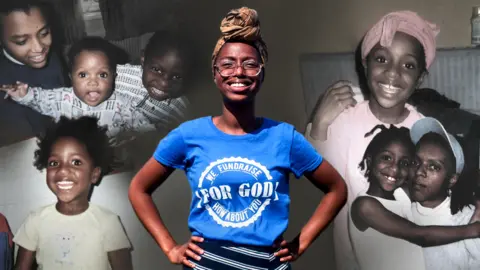 BBC
BBCIt was Christmas Day 2018 in Carol Morgan's home in Battersea, south London and she was spending it with her three children, Dionne, Earl and Shonah.
On the table was dinner for the family - turkey, stuffing, salad and rice and peas - and Monopoly was laid out ready for a big game that Earl would probably win. He almost always did.
But there was one person missing from the house - Carol's daughter Joy.
Carol had spoken to her daughter on the phone that day to try to persuade her to join the family at her aunt's house for a Boxing Day celebration.
"I was begging her to come to her auntie's party," Carol says.
She even offered to pay for a taxi for Joy to get up to London from her student accommodation in Hatfield, Hertfordshire.
But Joy refused to come.
The reason why Joy didn't want to join her family is because for some years she had been a member of a strict church, which discouraged members from celebrating Christian festivals.
Carol would never see her daughter again.
 BBC
BBC
 BBC
BBCJoy from south London
 BBC
BBCFlicking through the photo albums in Carol's 10th-floor flat there are numerous photos of Joy as a child surrounded by her brother, sisters and cousins.
Whether it's on a trip to Jamaica, holding her cake on her 7th birthday or on a fairground ride - one thing you notice is that Joy is always smiling.
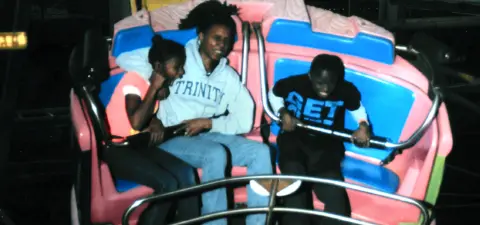 MOrgan Family
MOrgan FamilyTo her family, she lived up to her name. She was a joy to be around.
"She's lovely, over-the-top, irritating, beautiful, compassionate, caring," says Carol, 51.
"She would buy sweeties, Christmas presents, she'd remember me, take photographs, cook dinner for me. She was just lovely, an all-round superstar in my eyes, truly.
"I suppose that's a bit over the top because I'm her mum. But it really was like that."
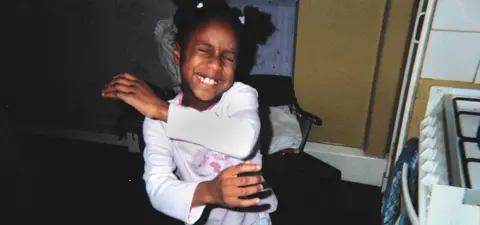 Morgan Family
Morgan FamilyGrowing up, the family didn't have a lot of money, and Carol often worked 12-15 hour shifts as a care worker.
But family time was important and they would do little things like go to Battersea Park or cook together.
"Our treat was we'd go swimming and we'd walk from Latchmere Swimming Bath down to Falcon Road. There'd be this chicken shop on the corner which used to do £2 meals," says Carol.
"Sometimes I'd have no money, but I used to walk up and down to all the different parks."
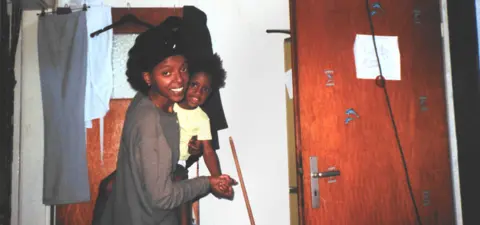 Morgan Family
Morgan FamilyEducation was important to Joy, and she would nag her cousins and brother and sisters to do the best they could.
"She liked to make sure you were doing the best for yourself," says her 23-year-old brother Earl, to whom Joy was particularly close.
"Stuff like looking for jobs, going to college, she always wanted to make sure that you were doing the most you could do with the surroundings that you have."
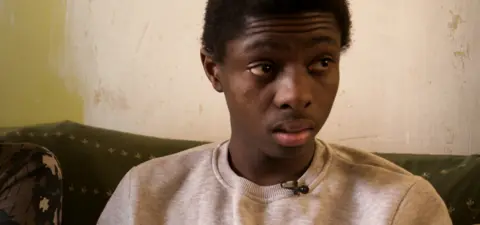 BBC
BBCSo it was no surprise to her family when Joy decided she wanted to become a midwife.
Joy was studying midwifery at the University of Hertfordshire when she disappeared. She wanted to go on to be a doctor.
"I said to her: 'I know one day you won't be in England. You won't be looking after us Europeans, you'll be going to Africa'," Carol remembers.
"I'd have been getting postcards from other countries. Once she got her qualifications she would've been off."
But Joy's life hadn't always been easy and some deaths in the family had hit her hard.
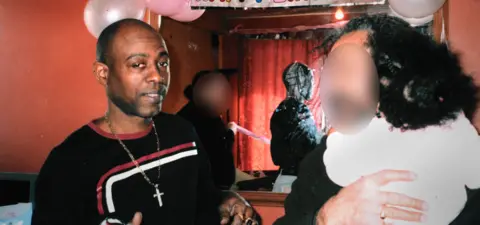 MOrgan Family
MOrgan FamilyHer uncle Prince, who she was also close to, died from cancer in 2006. Six years later, her stepfather passed away from the same disease.
Then in 2014, Joy's father killed himself.
Her family says it was not long after that Joy started to get interested in a US-based church called Israel United in Christ.
"It was a weird church," says Carol. "It told you that you should divide people by colour."
It became a huge part of Joy's life and she started to pull away from her mum and siblings.
In a video filmed just two weeks before she went missing, Joy explained what the church meant to her.
"IUIC is my family and like the best family that I've ever had."
 BBC
BBC
 BBC
BBCJoy's new church
 BBC
BBCIsrael United in Christ (IUIC) was founded in 2003 in New York and is part of a movement called the Black Hebrew Israelites.
It has around 40 churches or "schools" as they're known in the US - and its leader is a man who goes by the name of Bishop Nathanyel Israel.
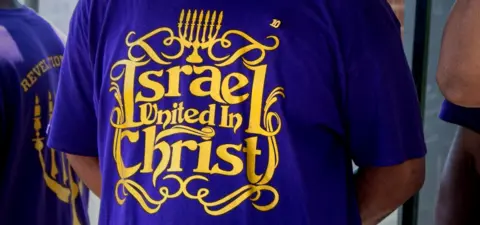 Alamy
AlamyIUIC teaches that black people, Hispanics and Native American people are God's chosen ones and are the descendants of the Biblical 12 tribes of Israel.
The organisation spreads its message through videos posted on the internet, and over the years churches have been set up in other parts of the world - including one in the UK.
Its leaders teach classes on YouTube on topics such as: "Why white people hate black people", "A strong marriage makes for a strong nation" and "Black people must leave the Christian Church".
And it's the slick videos and messages about uplifting black people which initially attract people into the organisation, according to former members.
"In the beginning it was a proud feeling. It was a feeling of being a part of a unified group," says Gina Blue, an ex-member of IUIC Las Vegas.
 Gina Blue
Gina Blue"You don't see a lot of black people together so I had a sense of pride and a sense of, yes we're actually organising something, we're doing something for God."
"The positive thing was always seeing people change," says Bezaleel Ben Israel, an ex-IUIC member who lives in Texas.
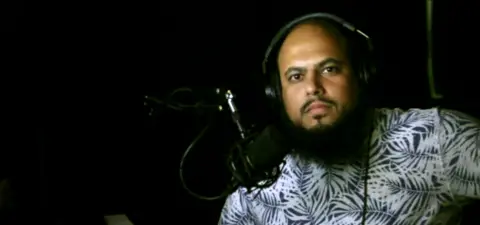 Bezaleel Ben Israel
Bezaleel Ben Israel"I watched men who came in who were drug addicts, drug dealers, and they were having a hard time getting over these things, coming out of the 'world'.
"And they actually changed."
He explains that being in the "world" means being a part of society and everyday life - and not following the Israelite faith.
But IUIC has some controversial views.
It claims that the Bible says that when Jesus Christ returns to Earth, the Israelites will be the rulers and all the other races will become their servants.
"They have the belief that caucasians are literally, not metaphorically, the devil," says Heidi Beirich from the US civil rights group Southern Poverty Law Center (SPLC).
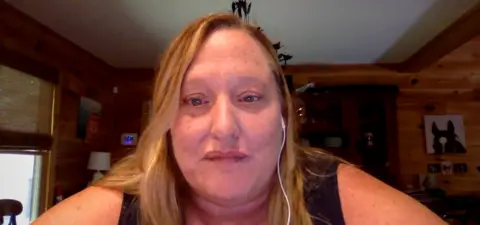 BBC
BBC"So white people and what they've done with slavery, for example, and other ways of oppressing black people are because they're the devil.
"It's like white people are genetically driven to destroy black people. And that's the part that makes white people the devil in this interpretation."
It's these views that have led the SPLC to label the organisation as a "black nationalist hate group" and "racist".
"[They are] racist against white people, racist against Jews. And another part of this group which isn't discussed very much is that they're incredibly homophobic, as well. For those reasons anti-LGBT beliefs, anti-white beliefs, anti-Semitic beliefs, all of that together is the reason we list them."
In IUIC, members of the church are told to follow strict rules which it claims are set out in the Bible.
Sex before marriage is forbidden, and women and men aren't allowed to be alone together if they're not husband and wife.
Men and women also sit apart in church.
It also has a strict hierarchy system for the men only - Bishop Nathanyl at the top followed by deacons, captains, officers, soldiers and then brothers.
Women don't have formal ranks and are simply referred to as "sisters".
Anyone who breaks the rules or questions leaders can be demoted, punished or even kicked out the church, say former members.
"People were able to do bad things to other people and nobody would say anything because this person is an officer or this person was a captain," says Bezaleel.
"People were literally scared that they would lose their ticket to heaven if they spoke up against this person."
Gina remembers being told to stand in front of the congregation in Las Vegas for having a piece of hair outside of her head wrap.
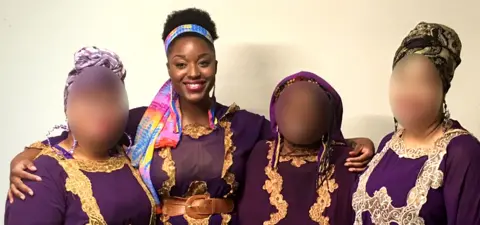 Gina Blue
Gina Blue"They stood me up one too many times, and I found myself really just crying and being very vulnerable and I was uncomfortable with that.
"I was really uncomfortable with being verbally abused. It's all men doing this. So they're grown men and just very aggressive and very harsh."
IUIC denies it's a hate group and says "at no point do we teach against the laws of the land or authorities".
It says former members who speak out against them are "disgruntled".



'IUIC is my family'
 BBC
BBCJoy first came across IUIC on the internet.
Carol remembers hearing the videos from her daughter's room in the early hours of the morning.
"It just sounded so harsh," she recalls.
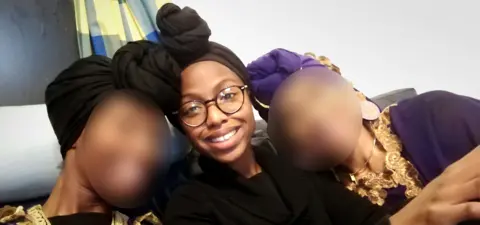 Facebook / IUIC member
Facebook / IUIC memberIn January 2016, Joy joined the UK branch of the organisation, which has a building in the centre of Ilford, east London.
The only sign this might be a church is a purple trimmed curtain blowing through an open window.
Standing at the door are male members with walkie-talkies, who act as security guards.
Joy and other members of the church would meet on a Saturday - known as the Sabbath.
She ran the children's group and hardly ever missed one of the church's festivals.
"The moment she started getting more and more into the church it was unbearable," says Carol.
"We were dirty people because we had not converted to the faith. That meant we were sinners.
"She would make you feel like you were diseased. That's how bad it was.
"We were excommunicated in our own home. She wouldn't talk to us.
"She would come into the house and if I had a vest top on, she'd say: 'Mum you need to cover yourself up, you need to take off your shoes'.
Joy's sister Dionne, 34, says she and Joy also became more distant after she joined the church.
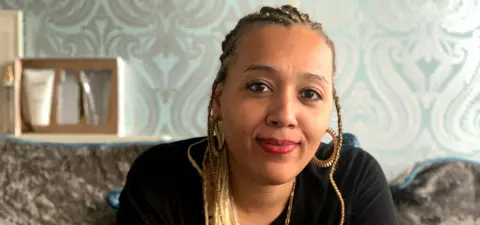 BBC
BBC"It was like, 'Whoa what's happened to Joy?' She hardly spoke to me."
She says one thing that really upset the family was that Joy would target her and her younger sister because they are both mixed race.
"In the Israelite church, you can't be an Israelite if your father is white man," Dionne says. "She would say to my little sister, 'You're a white devil'."
For Carol it got too much.
"The moment she called my mixed-raced daughter a demon, I said: 'No'.
"I took the laptop away and that was when things got to the point of arguments and she left."
Carol says Joy was then homeless, before being rehoused by the local council. She then moved into student accommodation in her first year at university.
Joy still spoke to her family but the distance between them had become bigger.
"She became someone different," says Dionne. "She came to separate herself from her family, which had been important to her. Because I know Joy loves her family.
"The teachings of church - it just seems like a cult and she just got swept away in it."
Former members say distancing yourself from your family if they're non-believers is something IUIC teaches.
"They say your family 'are in the world', they're of the devil because they don't know who they are," says Gina.
"They're lost so basically cut them off or you're not going to heaven. Their sins are going to be on you if you don't cut them off."
IUIC says the claims that it encourages members to cut off their families are "lies".



What happened to Joy?
 BBC
BBCOn the day that Carol so desperately wanted her daughter to join the family for a meal - 26 December - Joy was at a celebration at the IUIC church in Ilford.
Six weeks later, Carol received a phone call from the estate agent who looked after Joy's student accommodation.
Her daughter hadn't paid her rent and her housemates hadn't seen her since Christmas.
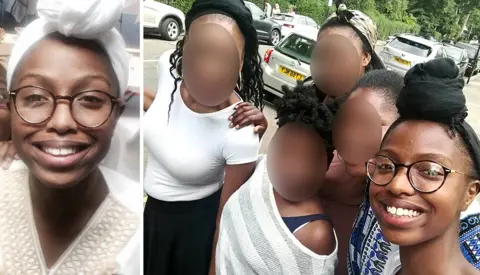 Facebook / IUIC member
Facebook / IUIC memberCarol admits she didn't realise anything was wrong until she got that call.
"I will be forever sorry for that," she says.
She reported her daughter missing on 7 February, and the police started to investigate her disappearance.
Officers spoke to Joy's housemates who told them that she was a regular member of IUIC.
They got some contact details of members from Joy's landlord, and started making calls to people in the church that knew her.
One of them was 40-year-old Shohfah-El Israel.
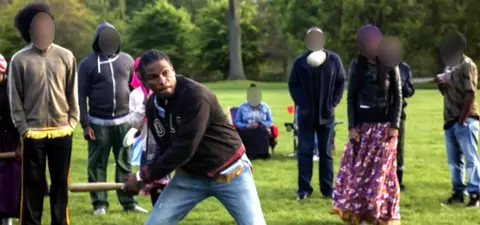 Facebook / IUIC member
Facebook / IUIC memberWhen police first spoke to him, he told them he'd last seen Joy on 26 December during the church meal, and he'd given her a lift back to her flat in Hatfield afterwards.
Two days later, officers pulled over his red Honda car onto the hard shoulder by junction 22 on the M25.
"You have been arrested on suspicion of the murder of Joy Morgan," an officer explained.
"She's dead?" he asked.
"I just want to ask if she's dead? I just want to ask if you know if she's dead, cos this is a shock. Is she dead?"
He and his wife were friends with Joy. They had two homes - a flat in Cricklewood, north London, and a rented house in Luton, Bedfordshire.
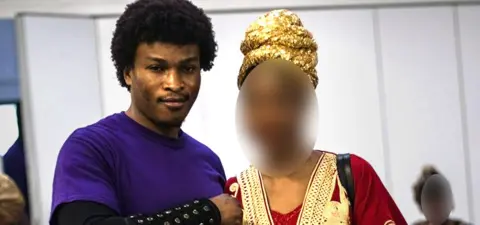 Facebook / IUIC member
Facebook / IUIC memberHis original name was Ajibola Shogbamimu but had changed his name in May 2018 - something IUIC encourages its members to do.
"He got his name for his voice," one former London member says.
"The Shohfah is the ram's horn. Because he had a very loud voice, he was a prominent speaker.
"One of the things IUIC does a lot of is street preaching, and they also do a lot of videos where they are doing teaching.
"And a brother who has a very distinctive loud voice is something to be celebrated."
Born in Nigeria, Shohfah-El Israel had lived in the UK since 1997.
He'd joined IUIC in December 2016 after being introduced to the church by his wife.
Shohfah-El Israel was liked by the leaders and rose to the rank of soldier during his time with the congregation.
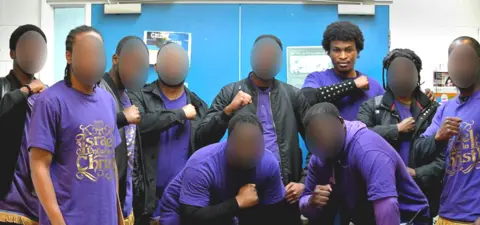 Facebook / IUIC member
Facebook / IUIC memberThe church described him as an "enthusiastic" member of the church who was "always offering to help in any way".
"He was very intuitive with ideas on reaching out to improve the community."
But there were times when he was warned about his behaviour.
Shohfah-El Israel was once demoted from the rank of soldier after he interrupted one of the church leaders who was speaking to members and got angry when he was corrected.
After his arrest, Shohfah-El Israel was questioned for two days before he was released on bail, while officers continued looking into the case.
Police then started to focus their investigation on parts of Stevenage in Hertfordshire.
Specialist search teams and police dogs carried out searches in woodland on the outskirts of the town.
Carol and Dionne even handed out leaflets in Stevenage town centre in the hope someone might know something about where Joy was.
On 27 February, the family were told Shohfah-El Israel had been charged with murder. He pleaded not guilty.
It would be another five months before Joy's family found out why the police believed she was dead and why Shohfah-El Israel was her murderer.
 BBC
BBC
 BBC
BBCThe trial
 BBC
BBCIt was a sunny evening on 7 July 2019 - the day before the trial was due to start.
Surrounded by her plants, Carol stood out on the balcony of her flat drying her hair and looking out across London.
"I open my balcony and I stand on it and when I look on my balcony I have to say 'Where are you Joy?' because I don't know where she is.
"There's only one person that knows and that's him."
It's a 40-mile journey from Carol's home in south London to Reading Crown Court.
Carol has Multiple sclerosis (MS) and has to use a stick to help her walk. But she wasn't going to miss a single day of the four-week trial.
The public gallery was packed with members of Joy's family, Shohfah-El Israel's family and members of IUIC.
Carol sat in the front row as she heard how Shohfah-El Israel told police he had dropped Joy back at her flat in Hatfield on 26 December.
 Julia Quenzler
Julia QuenzlerBut phone evidence showed that Joy's phone and the defendant's phone were in his flat in Cricklewood together for two nights after.
That's when he admitted he had taken Joy back to his place where she slept on the sofa.
"The reason I didn't bring it up before was because of my wife and people getting the wrong idea," he told police.
In tears, Carol had to leave the court when Shohfah-El Israel gave some of his evidence.
It was the first time she'd seen the man accused of murdering her daughter.
Dressed in a navy suit, wearing glasses and his hair in cornrows, he used a crutch and had a limp as he took to the stand. He claimed he suffered from chronic pain syndrome.
Shohfah-El Israel said Joy was upset and thinking about leaving the church after watching videos online of ex-IUIC members in the US explaining why they were no longer part of the organisation.
That's why he agreed to let her stay at his flat. His wife was at their other home in Luton.
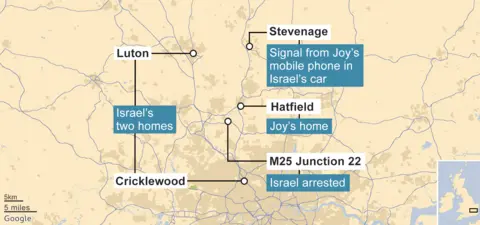 BBC
BBCBut what were they doing in his flat for two days?
Shohfah-El Israel claims they watched videos from ex-members on YouTube before he dropped her off at her home on the 28 December.
He denied having sex with Joy, whom he said he thought of as a "daughter".
Around 19.30 on 28 December, Joy's telephone number was suddenly removed from a church group instant messaging chat on Telegram.
It's one of the ways someone shows they have decided to leave the organisation.
Several IUIC members said this was a "surprise" as Joy didn't seem unhappy.
People tried to contact her on the phone to see if she was OK but couldn't get through.
The next day, Joy failed to turn up at church as usual.
So two members of the church went to her house looking for her - one of them was Shohfah-El Israel himself.
But no-one from the church contacted Joy's mum or the police about her sudden disappearance.
Outside court, Carol confronted some of the members about this.
"Why did none of you phone the local authorities, the police, the 999 services?," she asked.
"That's the thing that gets me. Isn't that a Christian thing to do? A real Christian thing.
"To care about another human being enough to call the police."
Back in court, the jury heard that Shohfah-El Israel's car was picked up on cameras near Stevenage. Around the same time, Joy's phone sent a signal from the same area on 28 December.
Over the next three days, he tried calling her and went to her house several times to check up on her.
But it was all part of his cover-up.
The prosecution said it was Israel who had removed her number from the group after he killed her.
His car was in Stevenage as he was "probably looking for somewhere to get rid of her body".
Joy's phone sent its final signal in the early hours of New Year's Day in Stevenage.
Shohfah-El Israel's phone was also in the same area.
Police later found Joy's house keys in his red Honda - seven weeks after she was last seen alive.
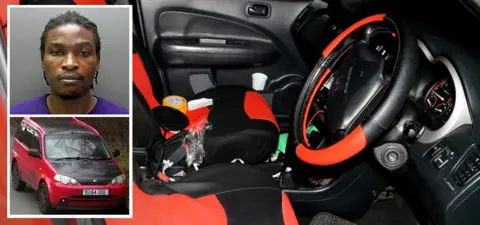 Hertfordshire Police
Hertfordshire PoliceIt was this piece of evidence that made Carol finally come to terms with the likelihood that her daughter was dead.
"She couldn't have been alive if she had no key to get into her flat," she says.
"She didn't phone me… that means she's not around."
After a four-week trial, a jury of eight women and four men found Shohfah-El Israel guilty of murder.
He was sentenced to life in prison with a minimum term of 17 years.
"Only you know the circumstances or details or your terrible deed and why you did it," said judge Mr Justice Soole.
"You are evidently an intelligent man and have said nothing beyond the lies and explanations which the jury has rejected."



Justice for Joy
 BBC
BBCA month on from the guilty verdict, Joy's name has disappeared from the headlines but there's no closure for her family.
There are still so many unanswered questions.
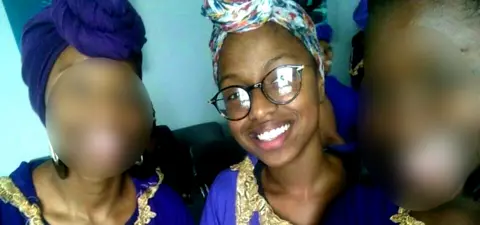 Facebook / IUIC member
Facebook / IUIC memberWhy did Shohfah-El Israel kill Joy? Where is her body? Did the church do enough to protect her?
One former member who knew Joy says she was let down by the church
"They failed her when her name was deleted from the Telegram group by not fiercely trying to find out if she's OK.
"We are taught that we are brothers and sisters and we are taught we are all we have and we are taught to look after the little ones.
"It just seems like Joy was failed by the very organisation that she loved and trusted and who were responsible to look after and protect her."
It's something Carol also believes.
"I don't respect the church. It just needs to be knocked down and taken apart because they are going on that men are the top and women are beneath them and that's it."
Israel United in Christ says when Joy went missing "all indications pointed to her leaving the church or wanting time away, not being in danger".
Speaking about Shohfah-El Israel, the church says his "conduct throughout the investigation and trial has been nothing short of disgraceful and is not in line with church principles".
It says he is no longer a member of Israel United in Christ.
The church says it doesn't address criticisms or allegations made by ex-members.
"We will make this clear, though, Israel United In Christ cares strongly about the wellbeing and safety of all our members and constantly strive to ensure improved safety procedures are in place."
It describes what happened as an "isolated incident".
"Regardless, we want the world to know that we seek to follow the laws of the land when not conflicting with the laws of the most high."
The investigation into the murder of Joy Morgan isn't closed.
Police hope that Shohfah-El Israel will tell them where he's put Joy's body or someone comes forward with a new piece of information.
Carol holds a map of Stevenage in her hand which shows the areas where the police have searched for Joy's body.
"My son's been going out looking for my daughter. He's a 23-year-old man and he's looking for his little sister.
"I have to be proud of him. It takes a really strong person to do that.
"But ask that man this: 'Should a 23-year-old brother be looking on a map for his little sister because you decide to take her away from us?
"How's he ever going to find her? It's a needle in a haystack. If my daughter was metal she'd be easier to find."
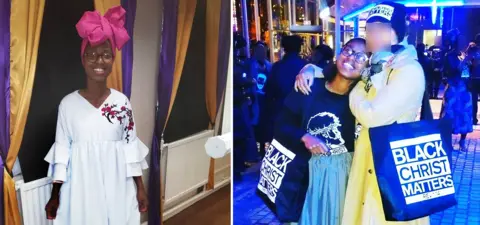 Facebook / IUIC member
Facebook / IUIC member"I just can't let her be forgotten. She's not going to just be some little story. I've got to do more than that for my daughter.
"She will be found. I don't know when, but she will be found."
For Carol, finding her daughter is what she's clinging onto.
Update 10 October: Police have confirmed that a body found in woodland in Stevenage is that of Joy Morgan.
 BBC
BBCTop image copyright Morgan family / Facebook / IUIC member


